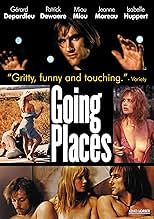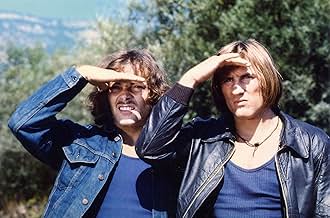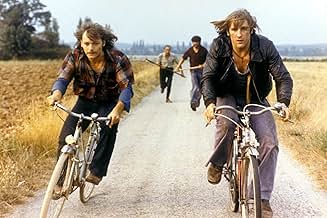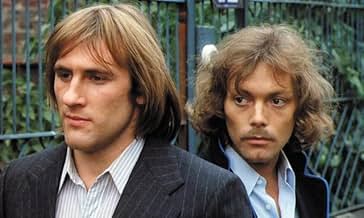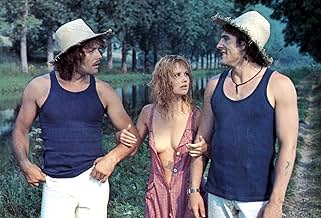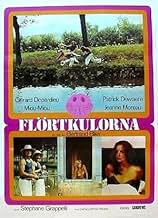VALUTAZIONE IMDb
7,1/10
10.401
LA TUA VALUTAZIONE
Due teppisti molestano, rubano, uccidono, Marie-Ange, una parrucchiera sfinita e passiva, si unisce a loro come amante, cuoca e madre confessore, alla ricerca di un piacere sessuale apparent... Leggi tuttoDue teppisti molestano, rubano, uccidono, Marie-Ange, una parrucchiera sfinita e passiva, si unisce a loro come amante, cuoca e madre confessore, alla ricerca di un piacere sessuale apparentemente irraggiungibile.Due teppisti molestano, rubano, uccidono, Marie-Ange, una parrucchiera sfinita e passiva, si unisce a loro come amante, cuoca e madre confessore, alla ricerca di un piacere sessuale apparentemente irraggiungibile.
- Regia
- Sceneggiatura
- Star
Recensioni in evidenza
There will be people who are able to fully identify with our two main actors (and/or the main female in this), but there may also be some who can't really get their deal entirely. I don't think the characters are or should be role models. On the other hand, the struggle is real. If you are not able to see or have a goal, what do you do? Where do you go? How do you achieve satisfaction? (very much pun intended in this case).
Now having said that, the acting is more than rock solid and while there are cringe worthy scenes (some things feel like at least sexual harassment, until the female involved caves in, like in the train), viewers may experience them differently. Especially considering the free loving decade this was shot and made in. There's a vibe here that you have to accept. Some things are easier to swallow others not so much. But while there is a lot of innuendo and a lot of sexual situation (including a lot of nudity), this is not so much titilating as it is funny. Still more of a road movie/drama, this is quite the experience and voyage one takes with those mischiefs/small time crooks ...
Now having said that, the acting is more than rock solid and while there are cringe worthy scenes (some things feel like at least sexual harassment, until the female involved caves in, like in the train), viewers may experience them differently. Especially considering the free loving decade this was shot and made in. There's a vibe here that you have to accept. Some things are easier to swallow others not so much. But while there is a lot of innuendo and a lot of sexual situation (including a lot of nudity), this is not so much titilating as it is funny. Still more of a road movie/drama, this is quite the experience and voyage one takes with those mischiefs/small time crooks ...
The movie has a distinct (albeit brutish and rough) humanity for all its borderline depravity - the zippy/lyrical score points up the comic side of their misadventures, and even when they're at their most thuggish (like terrorizing the woman on the train), a semi-pitiful vulnerability lurks never far away (Dewaere sucks on her breasts like a baby). Blier cuts away from the scene where Depardieu may be about to rape Dewaere, so we're never sure how explicitly to read the manifestly homoerotic aspect of their relationship - either way, that incident is the start of their relative humanization (so the movie could certainly be read as pro-gay, although it could likely be read as pro-anything you want). The movie has many objectionable scenes and points of sexual politics and is probably best taken as a general cartoon on the foibles of both sexes, making a mockery of the whole notion of sensitivity and honesty, and hitting numerous points of possible profundity on the basis that if you fire off enough shots, some of them are bound to hit.
"They don't make movies like this anymore" has been used for so many movies but in the case of "Les Valseuses" (or "Going Places") you might say, "they can't make movies like this anymore". Whether it's a positive or a negative is a matter of opinion.
From the way I see it, only a gender swap would justify a remake for it's impossible to imagine a filmmaker making a film, let alone a debut, about two marginals at the prime of their masculine strength enjoying harassing and assaulting women, making us wish they could 'just' keep on stealing cars or money. It's quite fitting that the title is a slang term meaning "balls" in French as that's what it takes to dare concoct such a vitriolic story, even in the liberated post-68 France. One can despise Bertand Blier's misuse of talents but not without admiring his nerve.
The film met with commercial success and was one of the highest-grossing of the year only topped by the erotic "Emmanuelle". I guess the timing worked in favor of Blier for the cinematic community was eager to embrace a sort of free-spirited joyful anarchical ride by thugs who don't give a damn about the consequences of their action in their quests for instant pleasures. It's a revenge of the "populo" against the little ones and the weaselly bourgeois hiding in the limited coziness of their suburban life.
The opening sequence says it all, Jean-Claude played by Depardieu is sitting in a caddie (the symbol of consumerist society) pushed by Pierrot (Patrick Dewaere), they swing across a deserted street, preying on a fat woman they end up cornering next to her apartment, steal her purse after stealing a few kisses. The scene is not enjoyable but has the merit of setting the tone, making the starting point of your rooting below "zero" and it's a credit to a solid narrative and the incredible writing talent of Blier (who wrote the original 72 novel) to make these characters reach a certain point of likability.
They're no better at the end, but they realize sex and money can't be the only drivers, there's got to be more than or behind that. The caddie scene already established them as drifters and vagabonds, but that's the stuff poetry was made off and in the first post-war oli-crisis, where good society looked for scapegoats, they were targets, too. And so when they bring a stolen car back to its owner Pierrot gets shot in the groin. Their only trophy is Marie-Ange (Miou-Miou) a worker used and abused by the car owner. Point is made that even the victims aren't always innocent in that rigged game of life.
One could see a tactical trick from Blier who doesn't make us root for his antiheroes rather than show the rest no better than them, but there are exceptions: the doctor who heals Pierrot isn't immune to a robbery, Jean-Claude even makes the sinister threat of "paying goodnight to his children". And later in a train, they watch a woman (Brigitte Fossey) breastfeeding her baby and one thing leading to another, Pierrot suckles the woman's breast while Jean-Claude titillates her. Now that's hardly a detail and as horrific as the scene is (and it is) it mostly highlights the insecurity of the thugs and their incapability to draw moral lines into their actions. A honest question would be "why"?
They're bad guys, but indeed, why? Marie-Ange is used as a sexual object and while Jean-Claude is having a good time, she doesn't. Pierrot can't bring himself to pleasure fearing impotence from the wound. Earlier, the car mechanic took Marie-Ange as a 'benefit in kind' but got upset because she was frigid. Marie-Ange is the catalyst character in the way she reveals the limit of the Pierrot and Jean-Claude's hedonism, inasmuch as they want to bring her to pleasure, they're so focused on their own that ultimately it backfires at them. It might explain Pierrot's need for tenderness in the infamous train sequence, a wish to reassure himself that it's still working. It's a quest of pleasure but unlike money, it takes two to get it, and it's a miracle that nothing coming close to a real rape is shown.
I guess that would have prompted people to walk out the theaters and Ebert himself, hated the film for its uncompromising sociopathy, saying Bertrand Blier (who wrote the original novel) almost presented himself as a man one would like to spend time with. Still, despite the virulent criticism it got in France, the film became the equivalent of "Easy Riders". There is wildness, unpredictability but even a tenderness during a segment where the duo meets a former inmate played by Jeanne Moreau, a woman they wish to bring her as much pleasure as she needs. Ultimately even Marie-Ange would reach the fourth sky and as the plot moves forward, the film gets a little less macho-centric. And by playing it a little less 'fast and furious', the two thugs become more genuinely appealing.
And their appeal with a teenager named Jacqueline (Isabelle Huppert) speaks volume about the way self-proclaimed and careless rebels are regarded, like romantic figures. Any lesser film would have made it look manipulative but Dewaere and Depardieu have such great chemistry and are so complementary, one is nervous and cerebral, the other is flamboyant and exuberant, so maybe the success of the film lies in that simple truth, with the right cast, you can get away with everything, except for a few scenes. But to call Blier misogynistic would be unfair, unlike "Last Tango in Paris", the shooting went well, no polemic resurfaced and even Miou-Miou said she had great memories (she even worked with Blier again).
And thankfully, Blier would sign other great movies where women would be treated with more consideration, but heneeded one shocker, one punch in the guts of good taste and social convenience to put himself in the radar. And so he did.
From the way I see it, only a gender swap would justify a remake for it's impossible to imagine a filmmaker making a film, let alone a debut, about two marginals at the prime of their masculine strength enjoying harassing and assaulting women, making us wish they could 'just' keep on stealing cars or money. It's quite fitting that the title is a slang term meaning "balls" in French as that's what it takes to dare concoct such a vitriolic story, even in the liberated post-68 France. One can despise Bertand Blier's misuse of talents but not without admiring his nerve.
The film met with commercial success and was one of the highest-grossing of the year only topped by the erotic "Emmanuelle". I guess the timing worked in favor of Blier for the cinematic community was eager to embrace a sort of free-spirited joyful anarchical ride by thugs who don't give a damn about the consequences of their action in their quests for instant pleasures. It's a revenge of the "populo" against the little ones and the weaselly bourgeois hiding in the limited coziness of their suburban life.
The opening sequence says it all, Jean-Claude played by Depardieu is sitting in a caddie (the symbol of consumerist society) pushed by Pierrot (Patrick Dewaere), they swing across a deserted street, preying on a fat woman they end up cornering next to her apartment, steal her purse after stealing a few kisses. The scene is not enjoyable but has the merit of setting the tone, making the starting point of your rooting below "zero" and it's a credit to a solid narrative and the incredible writing talent of Blier (who wrote the original 72 novel) to make these characters reach a certain point of likability.
They're no better at the end, but they realize sex and money can't be the only drivers, there's got to be more than or behind that. The caddie scene already established them as drifters and vagabonds, but that's the stuff poetry was made off and in the first post-war oli-crisis, where good society looked for scapegoats, they were targets, too. And so when they bring a stolen car back to its owner Pierrot gets shot in the groin. Their only trophy is Marie-Ange (Miou-Miou) a worker used and abused by the car owner. Point is made that even the victims aren't always innocent in that rigged game of life.
One could see a tactical trick from Blier who doesn't make us root for his antiheroes rather than show the rest no better than them, but there are exceptions: the doctor who heals Pierrot isn't immune to a robbery, Jean-Claude even makes the sinister threat of "paying goodnight to his children". And later in a train, they watch a woman (Brigitte Fossey) breastfeeding her baby and one thing leading to another, Pierrot suckles the woman's breast while Jean-Claude titillates her. Now that's hardly a detail and as horrific as the scene is (and it is) it mostly highlights the insecurity of the thugs and their incapability to draw moral lines into their actions. A honest question would be "why"?
They're bad guys, but indeed, why? Marie-Ange is used as a sexual object and while Jean-Claude is having a good time, she doesn't. Pierrot can't bring himself to pleasure fearing impotence from the wound. Earlier, the car mechanic took Marie-Ange as a 'benefit in kind' but got upset because she was frigid. Marie-Ange is the catalyst character in the way she reveals the limit of the Pierrot and Jean-Claude's hedonism, inasmuch as they want to bring her to pleasure, they're so focused on their own that ultimately it backfires at them. It might explain Pierrot's need for tenderness in the infamous train sequence, a wish to reassure himself that it's still working. It's a quest of pleasure but unlike money, it takes two to get it, and it's a miracle that nothing coming close to a real rape is shown.
I guess that would have prompted people to walk out the theaters and Ebert himself, hated the film for its uncompromising sociopathy, saying Bertrand Blier (who wrote the original novel) almost presented himself as a man one would like to spend time with. Still, despite the virulent criticism it got in France, the film became the equivalent of "Easy Riders". There is wildness, unpredictability but even a tenderness during a segment where the duo meets a former inmate played by Jeanne Moreau, a woman they wish to bring her as much pleasure as she needs. Ultimately even Marie-Ange would reach the fourth sky and as the plot moves forward, the film gets a little less macho-centric. And by playing it a little less 'fast and furious', the two thugs become more genuinely appealing.
And their appeal with a teenager named Jacqueline (Isabelle Huppert) speaks volume about the way self-proclaimed and careless rebels are regarded, like romantic figures. Any lesser film would have made it look manipulative but Dewaere and Depardieu have such great chemistry and are so complementary, one is nervous and cerebral, the other is flamboyant and exuberant, so maybe the success of the film lies in that simple truth, with the right cast, you can get away with everything, except for a few scenes. But to call Blier misogynistic would be unfair, unlike "Last Tango in Paris", the shooting went well, no polemic resurfaced and even Miou-Miou said she had great memories (she even worked with Blier again).
And thankfully, Blier would sign other great movies where women would be treated with more consideration, but heneeded one shocker, one punch in the guts of good taste and social convenience to put himself in the radar. And so he did.
I only lasted through fifteen minutes of this. The first scene has the two main characters - big strong guys - chasing a middle-aged woman around a block of flats and finally cornering her. The woman is prim and prissy and no-one I'd want to know. Her behaviour is as childish as theirs. But there's two of them and only one of her, and they're stronger than her. It really disturbs me that so many people seem to find this scene, and the ones that follow, funny. I think there's a big difference between being bourgeois and having some basic compassion for the human condition. In fact the emptiness of the main characters strikes me as at least as bourgeois in its way as the people who are into glossy cars and so on. Too bad, since I love Stephane Grappelli.
Not so many people like the movies of Bertrand blier simply because they don't understand them. Simply because they are different kinds of people.
If you have not been living under a deep desperation intertwined with great personal hope it may be hard for you to enjoy the humor blier shown here.
And also the film of blier cannot be classified easily as black-comedy or cult etc. like those of pulp fiction etc. Because there is this delicacy which the audience of north-america frequently fail to appreciate.
When I looked at these two `hooligans' dining with Jeanne moreau in the seaside restaurant, I felt they were more gentil than any gentleman can have been.
The urge to make love wildly like these is the normal reaction we feel under the unbearable pressure of meaningless being-symbolized by the camion suddenly emerges at the Carrefour.
SO, les valseuses is much better a name than going places. To dance a valse you need to be elegant, but going places you don't.
If you have not been living under a deep desperation intertwined with great personal hope it may be hard for you to enjoy the humor blier shown here.
And also the film of blier cannot be classified easily as black-comedy or cult etc. like those of pulp fiction etc. Because there is this delicacy which the audience of north-america frequently fail to appreciate.
When I looked at these two `hooligans' dining with Jeanne moreau in the seaside restaurant, I felt they were more gentil than any gentleman can have been.
The urge to make love wildly like these is the normal reaction we feel under the unbearable pressure of meaningless being-symbolized by the camion suddenly emerges at the Carrefour.
SO, les valseuses is much better a name than going places. To dance a valse you need to be elegant, but going places you don't.
Lo sapevi?
- QuizThe original French title is slang for "balls" (the testicular variety).
- BlooperTutte le opzioni contengono spoiler
- Versioni alternativeDespite being already rated "18" the German version is heavily cut, removing the following scenes:
- The rape of "Ursula" and the fight/chase sequence with the locals afterwards.
- The fight with the vigilantes after meeting Marie-Ange.
- Between getting a new car from the mechanic and looking for a doctor there's a sequence missing when Marie-Ange has sex with the mechanic.
- Hitting and driving over the store detective.
- The theft of two bikes from a farmhouse.
- Jean-Claude having sex with Pierrot just before leaving the beach house (this is later referred to by Pierrot when he says: "You surprised me, you bastard!")
- A longer sex scene between Jeanne, Jean-Claude and Pierrot after she starts to get down on Pierrot.
- In-between cuts of Marie-Ange being "educated" by Jacques, while Jean-Claude and Pierrot wait and fish outside the farmhouse.
- Jacqueline being "educated" by Jean-Claude, Pierrot and Marie-Ange.
- ConnessioniFeatured in Un jour, un destin: Patrick Dewaere: Le dernier jour (2007)
I più visti
Accedi per valutare e creare un elenco di titoli salvati per ottenere consigli personalizzati
- How long is Going Places?Powered by Alexa
Dettagli
Botteghino
- Lordo Stati Uniti e Canada
- 771.540 USD
- Tempo di esecuzione1 ora 58 minuti
- Mix di suoni
- Proporzioni
- 1.66 : 1
Contribuisci a questa pagina
Suggerisci una modifica o aggiungi i contenuti mancanti


![Guarda Bande-annonce [OV]](https://m.media-amazon.com/images/M/MV5BYThkNDA3OGQtYTRkMy00MDEyLWFiODctM2EzMjZjNDk4NjU5XkEyXkFqcGdeQXRyYW5zY29kZS13b3JrZmxvdw@@._V1_QL75_UX500_CR0)

